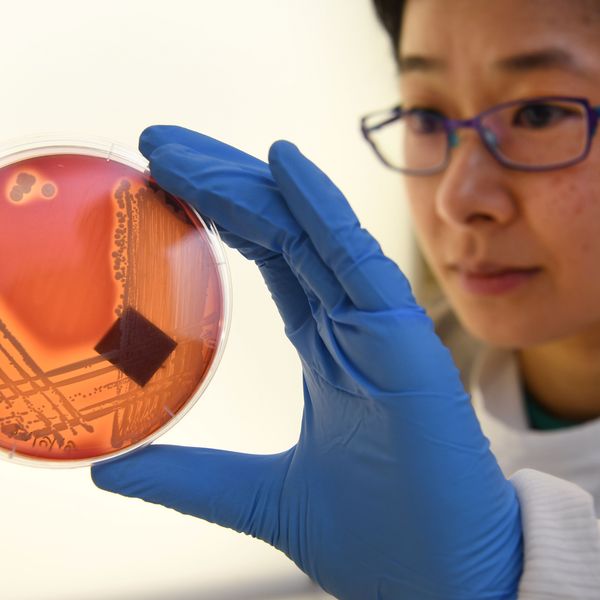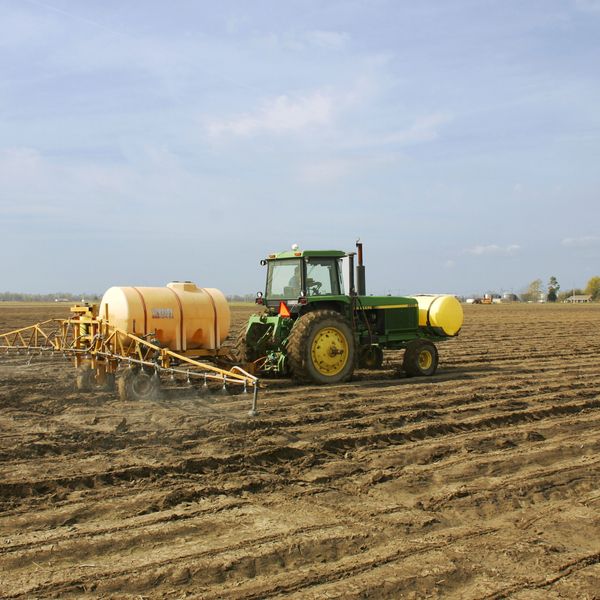Widely Used Pesticides Pose Bigger Threat Than DDT: Watchdog
New report by Environmental Commissioner of Ontario says 'swift action needed to avert crisis'
A class of widely used pesticides called neonicotinoids poses a bigger ecological threat than DDT, an environmental watchdog has warned.
Environmental Commissioner of Ontario Gord Miller issued the cautionary words Tuesday while speaking to press about his just-released annual report, which includes a section on the "Plight of Pollinators."
Explaining the problems with neonicotinoids, also known as neonics, the report states: "Troubling questions are being raised about the broader environmental effects of these pesticides. Only a small portion of the active substance is taken up by plants in seed-treated crops, and the rest enters the environment. This is of concern because neonicotinoids are not only persistent in soil and water, but are also water soluble and highly mobile within ecosystems."
Ontario, where use of neonics is extensive, has been experiencing higher than normal overwintering normal losses of bees, and increasing evidence has linked the pesticides to lethal and non-lethal harm to the pollinators. Facing economic hardship from these losses, beekeepers in the province sought last month to bring a class action suit against makers of neonics.
Bees "really are the canary in the coal mine," Miller said.
"The impacts of neonicotinoids clearly are more wide-scale in the ecosystem. They are affecting the wild bees, other insects. They're getting into the wild plants, they're getting into the aquatic systems, and they're affecting the food supply to our insect-eating birds."
"We know that the impacts are extending into the ecosystem," he said, "We don't know at this time know the full magnitude."
"I'm very concerned," he said.
In terms of its pollution, Miller said that there's never been anything like this before. The science before him, he said, "suggests to me as an ecologist that this is the biggest threat to the structure and ecological integrity of the ecosystem that I have encountered in my life--bigger than DDT."
He said he sees no science to indicate neonics' ability to increase crop yield; conversely, he said his report documents cases of farming without their use where production has increased.
Though his report does not call for a moratorium on neonics, he said he would be "glad to hear it" if the government put one in place.
"The Ontario government needs to take swift action and commit dedicated resources in order to avert a potential ecological and economic crisis," the report states. "The steps taken today to protect pollinators will determine the state of our biodiversity and food security for years to come."
The Ontario Beekeepers' Association responded to the report saying, "Although we would have liked a more specific call to action, we are pleased that the Commissioner recognizes the need for 'swift action.'"
An Urgent Message From Our Co-Founder
Dear Common Dreams reader, The U.S. is on a fast track to authoritarianism like nothing I've ever seen. Meanwhile, corporate news outlets are utterly capitulating to Trump, twisting their coverage to avoid drawing his ire while lining up to stuff cash in his pockets. That's why I believe that Common Dreams is doing the best and most consequential reporting that we've ever done. Our small but mighty team is a progressive reporting powerhouse, covering the news every day that the corporate media never will. Our mission has always been simple: To inform. To inspire. And to ignite change for the common good. Now here's the key piece that I want all our readers to understand: None of this would be possible without your financial support. That's not just some fundraising cliche. It's the absolute and literal truth. We don't accept corporate advertising and never will. We don't have a paywall because we don't think people should be blocked from critical news based on their ability to pay. Everything we do is funded by the donations of readers like you. Will you donate now to help power the nonprofit, independent reporting of Common Dreams? Thank you for being a vital member of our community. Together, we can keep independent journalism alive when it’s needed most. - Craig Brown, Co-founder |
A class of widely used pesticides called neonicotinoids poses a bigger ecological threat than DDT, an environmental watchdog has warned.
Environmental Commissioner of Ontario Gord Miller issued the cautionary words Tuesday while speaking to press about his just-released annual report, which includes a section on the "Plight of Pollinators."
Explaining the problems with neonicotinoids, also known as neonics, the report states: "Troubling questions are being raised about the broader environmental effects of these pesticides. Only a small portion of the active substance is taken up by plants in seed-treated crops, and the rest enters the environment. This is of concern because neonicotinoids are not only persistent in soil and water, but are also water soluble and highly mobile within ecosystems."
Ontario, where use of neonics is extensive, has been experiencing higher than normal overwintering normal losses of bees, and increasing evidence has linked the pesticides to lethal and non-lethal harm to the pollinators. Facing economic hardship from these losses, beekeepers in the province sought last month to bring a class action suit against makers of neonics.
Bees "really are the canary in the coal mine," Miller said.
"The impacts of neonicotinoids clearly are more wide-scale in the ecosystem. They are affecting the wild bees, other insects. They're getting into the wild plants, they're getting into the aquatic systems, and they're affecting the food supply to our insect-eating birds."
"We know that the impacts are extending into the ecosystem," he said, "We don't know at this time know the full magnitude."
"I'm very concerned," he said.
In terms of its pollution, Miller said that there's never been anything like this before. The science before him, he said, "suggests to me as an ecologist that this is the biggest threat to the structure and ecological integrity of the ecosystem that I have encountered in my life--bigger than DDT."
He said he sees no science to indicate neonics' ability to increase crop yield; conversely, he said his report documents cases of farming without their use where production has increased.
Though his report does not call for a moratorium on neonics, he said he would be "glad to hear it" if the government put one in place.
"The Ontario government needs to take swift action and commit dedicated resources in order to avert a potential ecological and economic crisis," the report states. "The steps taken today to protect pollinators will determine the state of our biodiversity and food security for years to come."
The Ontario Beekeepers' Association responded to the report saying, "Although we would have liked a more specific call to action, we are pleased that the Commissioner recognizes the need for 'swift action.'"
A class of widely used pesticides called neonicotinoids poses a bigger ecological threat than DDT, an environmental watchdog has warned.
Environmental Commissioner of Ontario Gord Miller issued the cautionary words Tuesday while speaking to press about his just-released annual report, which includes a section on the "Plight of Pollinators."
Explaining the problems with neonicotinoids, also known as neonics, the report states: "Troubling questions are being raised about the broader environmental effects of these pesticides. Only a small portion of the active substance is taken up by plants in seed-treated crops, and the rest enters the environment. This is of concern because neonicotinoids are not only persistent in soil and water, but are also water soluble and highly mobile within ecosystems."
Ontario, where use of neonics is extensive, has been experiencing higher than normal overwintering normal losses of bees, and increasing evidence has linked the pesticides to lethal and non-lethal harm to the pollinators. Facing economic hardship from these losses, beekeepers in the province sought last month to bring a class action suit against makers of neonics.
Bees "really are the canary in the coal mine," Miller said.
"The impacts of neonicotinoids clearly are more wide-scale in the ecosystem. They are affecting the wild bees, other insects. They're getting into the wild plants, they're getting into the aquatic systems, and they're affecting the food supply to our insect-eating birds."
"We know that the impacts are extending into the ecosystem," he said, "We don't know at this time know the full magnitude."
"I'm very concerned," he said.
In terms of its pollution, Miller said that there's never been anything like this before. The science before him, he said, "suggests to me as an ecologist that this is the biggest threat to the structure and ecological integrity of the ecosystem that I have encountered in my life--bigger than DDT."
He said he sees no science to indicate neonics' ability to increase crop yield; conversely, he said his report documents cases of farming without their use where production has increased.
Though his report does not call for a moratorium on neonics, he said he would be "glad to hear it" if the government put one in place.
"The Ontario government needs to take swift action and commit dedicated resources in order to avert a potential ecological and economic crisis," the report states. "The steps taken today to protect pollinators will determine the state of our biodiversity and food security for years to come."
The Ontario Beekeepers' Association responded to the report saying, "Although we would have liked a more specific call to action, we are pleased that the Commissioner recognizes the need for 'swift action.'"

